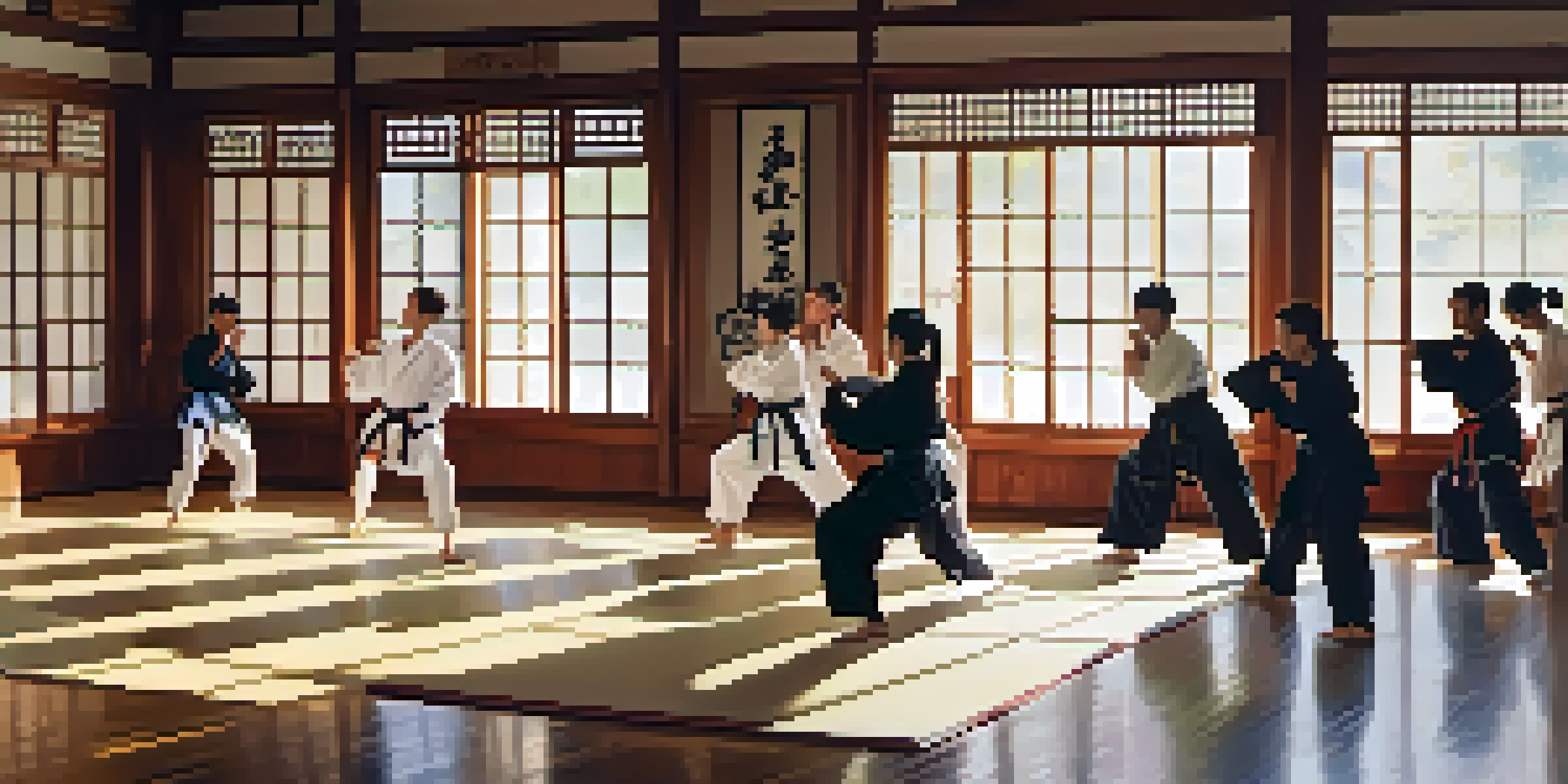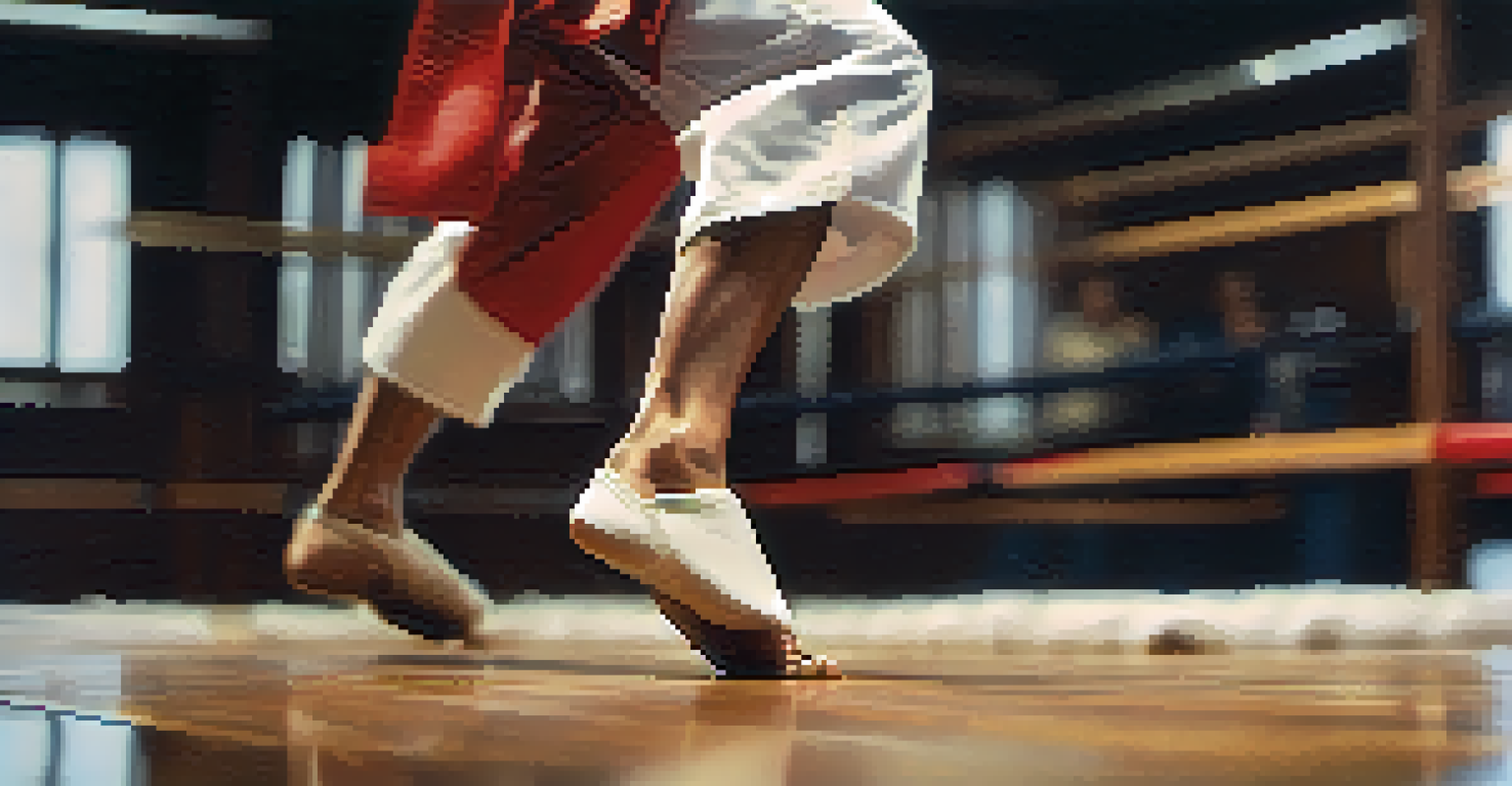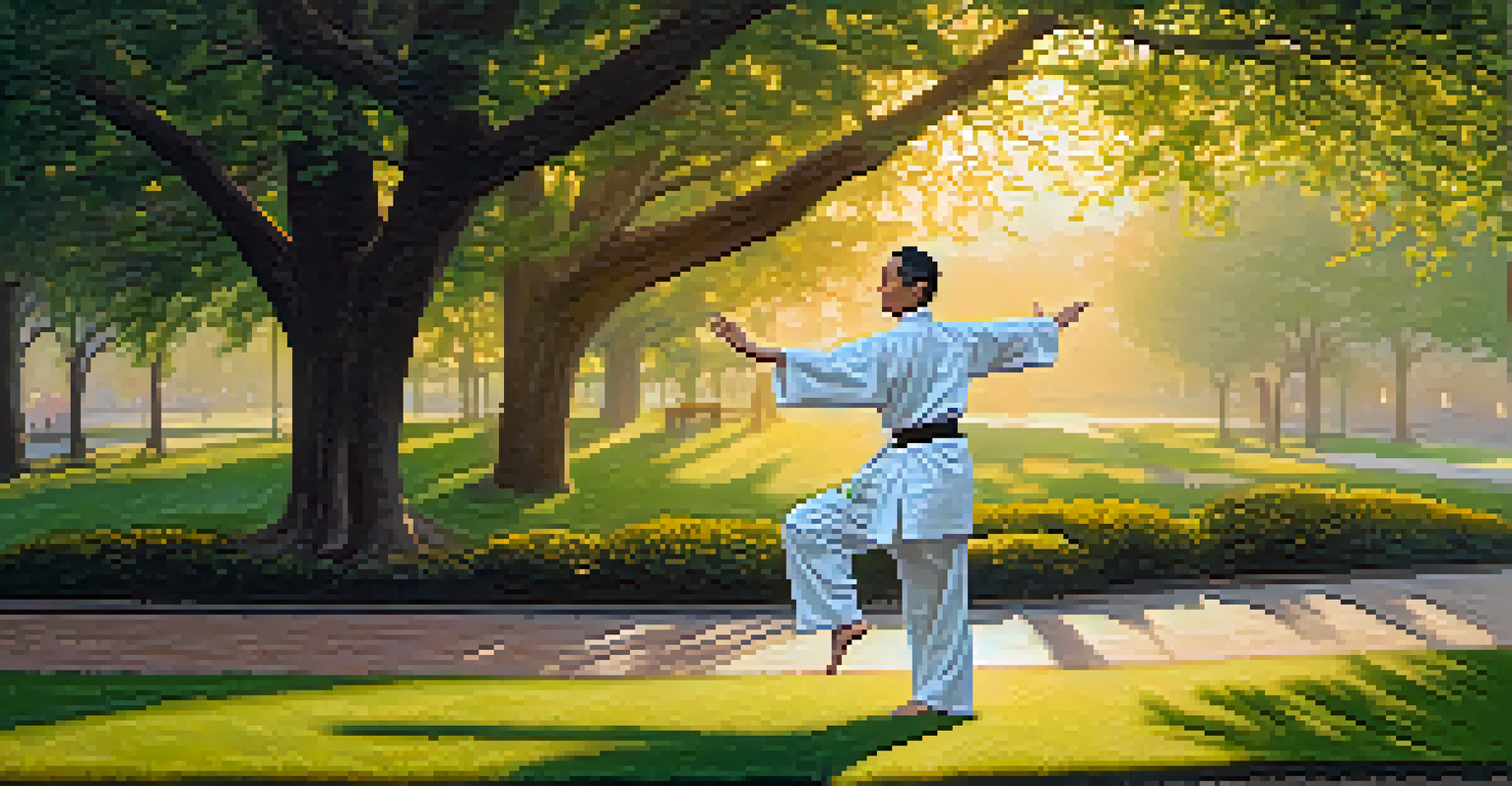Martial Arts as a Pathway to Enhanced Physical Fitness

Understanding Martial Arts and Physical Fitness
Martial arts encompass a variety of disciplines, each with unique techniques and philosophies. From karate to judo, these practices emphasize not just combat skills but also personal growth and discipline. Engaging in martial arts can serve as a comprehensive workout, enhancing both strength and agility.
The best fighter is never angry.
Physical fitness is often defined by several components, including endurance, strength, flexibility, and balance. Martial arts training effectively targets all these areas, making it an excellent choice for those looking to improve their overall fitness. By combining intense physical activity with mental focus, practitioners often find themselves more engaged in their fitness journey.
Moreover, martial arts encourage a holistic approach to health, addressing both the body and the mind. Whether you're a beginner or an experienced martial artist, the emphasis on technique and control can lead to significant improvements in physical fitness.
Building Strength and Endurance Through Training
One of the most significant benefits of martial arts is the development of muscular strength. Training routines often include various forms of resistance, such as bodyweight exercises and striking drills, which can build muscle and improve overall body composition. As you progress, you’ll likely notice enhanced strength and power in your movements.

Endurance is another crucial component that martial arts effectively develops. Many martial arts classes include high-intensity training sessions that push your cardiovascular limits. This not only helps in building stamina but also makes everyday activities feel easier over time.
Martial Arts Boost Overall Fitness
Training in martial arts enhances strength, endurance, flexibility, and balance, making it an excellent choice for holistic fitness.
As you train consistently, you'll likely experience an increase in your energy levels. The combination of strength and endurance training found in martial arts can lead to a more active lifestyle, making it easier to participate in various physical activities outside the dojo.
Enhancing Flexibility and Balance
Flexibility is vital for injury prevention and overall physical health, and martial arts training places considerable focus on stretching and mobility. Regular practice of techniques such as kicks and stances encourages the stretching of major muscle groups, leading to improved flexibility. This increased range of motion can enhance performance in other sports and physical activities.
Martial arts is not about fighting; it’s about building character.
Balance is another crucial skill cultivated in martial arts. Techniques often require specific stances and body positioning, which develop core strength and stability. As you learn to control your movements, you'll find that your balance improves not just in martial arts but in everyday life as well.
In essence, martial arts serve as a practical and enjoyable way to enhance both flexibility and balance. The skills learned on the mat can translate into better performance in various physical pursuits and can even help reduce the risk of injury in daily activities.
The Mental Benefits of Martial Arts Training
While martial arts are physically demanding, they also provide significant mental benefits. Practitioners often learn to focus their minds through meditation and breathing techniques, which can reduce stress and anxiety. This mental clarity not only enhances performance but can lead to improved emotional well-being.
The discipline required in martial arts fosters persistence and resilience. As you confront challenges in your training, you develop the ability to push through obstacles, which can translate into other areas of your life. This mindset can lead to greater achievements, whether in your fitness journey or personal goals.
Mental Resilience Through Training
Practicing martial arts fosters discipline and mental clarity, helping individuals tackle challenges both on and off the mat.
Additionally, martial arts cultivate a sense of community and connection with fellow practitioners. This social aspect can provide motivation and support, making it easier to stay committed to your fitness goals. The friendships formed in training can lead to a more fulfilling and enjoyable fitness experience.
Variety of Martial Arts Styles to Choose From
There are numerous martial arts styles, each offering unique benefits and experiences. For instance, Brazilian Jiu-Jitsu emphasizes ground techniques and submission grappling, providing excellent cardiovascular workouts while also enhancing strength and flexibility. Meanwhile, striking arts like Muay Thai focus on powerful kicks and punches, delivering a full-body workout.
Choosing a martial art that resonates with you can make all the difference in your fitness journey. Whether you prefer the fluid movements of tai chi or the fast-paced action of kickboxing, finding a style that you enjoy will keep you motivated and engaged. The variety ensures that you can keep your workouts fresh and exciting.
Exploring different styles can also enhance your overall fitness by exposing you to various techniques and training methods. You might find that mixing disciplines provides a more comprehensive workout, targeting different muscle groups and skills, which can keep you progressing toward your fitness goals.
Setting Realistic Goals in Martial Arts Fitness
Setting achievable goals is crucial for success in any fitness journey, including martial arts. Whether you're aiming to improve your strength, learn a new technique, or achieve a specific belt rank, having clear objectives helps maintain focus and motivation. Break down larger goals into smaller, manageable steps to track your progress effectively.
It's essential to remember that everyone's journey in martial arts is unique. Be patient with yourself, and celebrate the small victories along the way. This mindset fosters a positive attitude and encourages persistence, ultimately leading to greater success in your fitness endeavors.
Variety Keeps Workouts Engaging
With numerous styles to choose from, martial arts offer diverse training experiences that can prevent monotony and maintain motivation.
Additionally, discussing your goals with instructors or fellow practitioners can provide valuable support and accountability. They can offer insights and advice that may help you stay on track and overcome any challenges you face, ensuring a fulfilling martial arts experience.
Incorporating Martial Arts into Your Lifestyle
Incorporating martial arts into your lifestyle involves more than just attending classes. Consider setting aside specific times during the week for training and practice, whether it's in a formal class or at home. Consistency is key to reaping the full physical fitness benefits that martial arts offer.
Moreover, think about complementing your martial arts training with other forms of exercise. Activities like running, strength training, or yoga can enhance your performance on the mat and contribute to your overall fitness. This cross-training approach can help prevent burnout and keep your routine enjoyable.

Lastly, embrace the community aspect of martial arts. Participating in group classes, local events, or competitions can deepen your involvement and provide additional motivation. The camaraderie found in martial arts can make your fitness journey not only effective but also enjoyable.